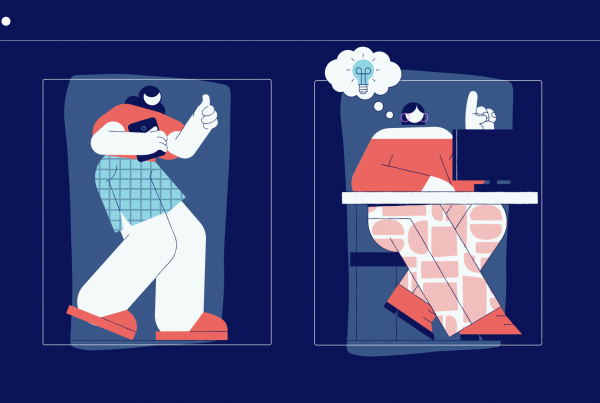Guest article by Maddie Davis
Modern technology has given consumers a heightened advantage when it comes to purchasing goods and services.
As giants, customer-centric companies like Amazon have shown consumers what exceptional, on-demand service can look like. And competitors have no choice but to step up their strategies. Consumers are demanding more of companies than ever before, and they want these demands delivered on their terms. But pleasing the modern customer doesn’t happen overnight.
Today’s businesses require an all-hands-on-deck mentality to offer each consumer the best possible experience, C-suite included.
Here is a CEO’s guide to creating optimal customer experiences for the modern customer.
The current state of CX
According to Bain & Company, 80% of CEOs believe they deliver superior customer experiences, while only 8% of their customers agree. Here lies the problem between the current state of customer expectations and customer experiences.
With technology at their fingertips, today’s consumers have the ability to add to or detract from a company’s reputation with a few taps of some buttons. The innovative CEO is taking note of this situation and looking to technology for a rescue.
Personalization
Machine learning and artificial intelligence are serving as pivotal tools in overcoming CX challenges. More companies are opting for machine learning to assist in processing the massive amounts of customer data that organizations are now privy to. As well as supplying real-time analysis and improving the accuracy of pricing models.
Utilizing the accumulated data, companies are also applying machine learning technology to improve customer-personalization efforts. Because just 22% of shoppers are satisfied with the level of personalization they’re currently receiving, working to improve these numbers should be a top priority for CEOs.
Today’s consumers expect individualized experiences with relevant recommendations and personalized offerings. Should a company fail to provide these valuable experiences, they risk losing business to their competitors.
Omnichannel experiences
As multiple-device shopping becomes increasingly popular, brands must make it a priority to offer a consistent level of service across all devices. For example, some customers are browsing a site on their tablet, searching reviews on their smartphone, and making purchases on their desktop.
The buyer’s journey is evolving, and CEOs must recognize the need for omnichannel experiences. This also involves integrating offline with online service for brands with ecommerce and physical storefronts.
CEOs doing CX right

Depending on management style and industry focus, everyone has their own idea of “right.” However, when it comes to customer experience there are a few commonalities that leaders in this field can be expected to possess. A few CEOs worth emulating include:
Oracle
As a tech company, Oracle is constantly evolving to provide innovative technology and services to meet their customers’ needs. Oracle creates unique experiences for their customers at all stages. For example, CEO Mark Hurd’s YouTube channel provides helpful information on company offerings, so shoppers can get a better idea of the company and the benefits of their products before consulting a customer-service-trained employee.
“CEOs need to build organizations and cultures and processes that let their companies move as fast as their customers and, in turn, can engage with those customers via whatever channel or combination of channels those customers choose.”- Mark Hurd
Zappos
Zappos is a customer favorite when it comes to service. Although the shoe business sold out to Amazon for $1.2 billion, CEO Tony Hsieh remains active in the company, working to create the best possible experience for his customers. By heavily tracking details and response times on customer interactions via “Phonez,” “Live Chatz,” and “Emailz,” teams are expected to constantly work on improving service.
“We take most of the money that we could have spent on paid advertising and instead put it back into the customer experience. Then we let the customers be our marketing.”- Tony Hsieh
Mitchell Stores
Fashion brands are among the most competitive in the world of optimized customer experiences. Chairman of Mitchell Stores, Jack Mitchell, follows the Harvard case study and time-tested philosophy of “hugging” customers. Playing on consumers’ desire for brands to demonstrate how much they value them through individualized experiences, the goal is to make customers look and feel great in their clothes.
“Exceptional customer service boils down to knowing your customers–really knowing them–their names and nicknames, what they do, their cat’s name, whether they like baseball or field hockey or curling. You must be caring and genuine!”- Jack Mitchell
Next Steps

As a business best practice, the role of a CEO should include the task of customer experience educator and enforcer. Here are a series of recommendations for optimizing your customer service strategy and customizing it for your market.
Know your customer
Knowing your customer base is essential in providing the experiences they desire. Creating ideal customer personas is a great tactic for achieving a thorough understanding of your customers’ characteristics.
Identifying your customers’ demographics, needs, wants, pain points, and interests can help your team effectively strategize how to best reach their targets and meet customer demands.
Establish performance metrics
Once you have a clear depiction of your customers, establish an understanding of what good customer experiences look like to them, as they relate to your brand. Figure out which areas you need to improve on, eliminate, or augment.
Assist customers with interactive tools
Customers don’t want to wait for an email or call support anymore. CEO’s are starting to adopt automated tools to engage with the customer while they’re navigating online, in order to fasten response times.
Customer experience tools such as Walkthroughs and ChatBots will continue to gain popularity as they answer common questions with automated messages. By encouraging the use of these tools, as a CEO, you allow your company to address the customers’ needs right when they are experiencing issues with your ecommerce website or application. In addition, reduce the workload of your customer team and reduce costs with support.
Leverage existing resources
The best CEOs recognize that creating great customer experiences is a team effort. Your employees are the biggest driver in good customer service, and it’s important to train them as such. Implementing an effective onboarding process with a customer-centric focus enables employees to adapt to your business culture and methods.
This can help ensure employees are confident and engaged in their roles. After all, companies with highly satisfied and engaged employees outperform their competitors by 147%.
Seek feedback
You can’t improve if you don’t know what you’re doing wrong. Utilize technology to gather customer data and dive deep into analytics. Based on your findings, you can engage customers on their preferred channels to request feedback on what you’re doing right and what you’re doing wrong. These insights will help create the experiences your customers want.
As technology continues to advance, so will the demands of consumers. Successful brands recognize this and are making the necessary adaptations to retain customers and best the competition.
We hope this piece guides your 2019 CX strategy, regardless of your position on the corporate ladder.
Thank you so much for reading! 🙏 If you enjoyed this article make sure to follow Helppier on Facebook and Twitter for more suggestions on customer experience, user onboarding and customer service. 😉 To see our interactive solution live make sure to schedule a demo!
About the author 👏




